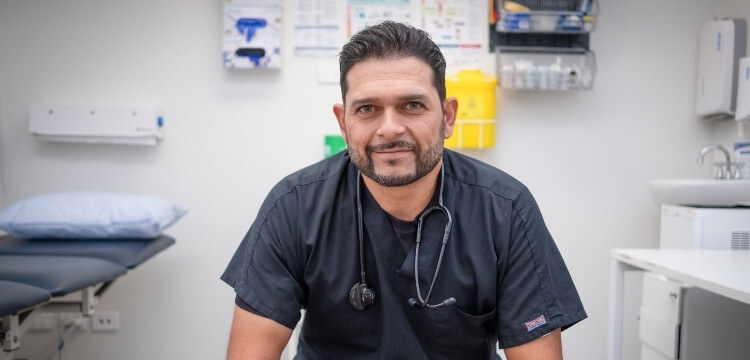A new campaign featuring Gabbi Gabbi man Dr Joel Wenitong is encouraging Aboriginal and Torres Strait Islander people to stay healthy and strong by doing a bowel cancer screening test every two years.
The campaign aims to raise awareness of the importance of bowel screening and increase participation of Aboriginal and Torres Strait Islander people in the National Bowel Cancer Screening Program. The Australian Government program provides people aged 50-74 years with a free screening test every two years.
Bowel cancer is Australia’s second biggest cancer killer and one of the most common cancers impacting Aboriginal and Torres Strait Islander people.
Australian Institute of Health and Welfare data (2018-2019) indicates that just over a quarter of Aboriginal and Torres Strait Islander people (27.3%) participated in the National Bowel Cancer Screening Program while a 2019 survey by Cancer Council found nearly half of eligible Aboriginal and Torres Strait Islander people surveyed weren’t up to date with any kind of cancer screening.
Dr Wenitong says early detection, through screening, can help save lives and reduce bowel cancer rates in Aboriginal and Torres Strait Islander people.
“Every year, around 15,000 new cases of bowel cancer are diagnosed in Australia, and 90% of those could be successfully treated if caught early,” said Dr Wenitong.
The at-home test kit is sent to people at their Medicare registered home address once they turn 50. People who have not received a kit or need a replacement kit are urged to contact the National Cancer Screening Register by visiting www.ncsr.gov.au or call on 1800 627 701. Health professionals can also order a kit on their patients’ behalf through the register.
Targeted campaign resources have been developed to support health professionals and community members in completing the test. Television and radio advertisements will run through First Nations media outlets, followed by a hard copy mail out of promotional stakeholder materials and events encouraging community members to have a yarn with their health professional if they have any questions.
Dr Joel has a simple message for mob. “If you’re feeling hesitant about completing the at-home bowel cancer screening test – don’t. It’s simple, easy and free, and helps you to stay healthy and strong.”
To find out more about the benefits of bowel cancer screening or to download campaign and stakeholder resources visit www.indigenousbowelscreen.com.au.












